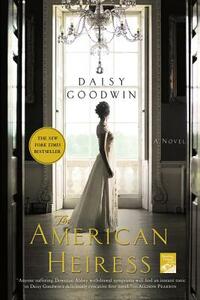You need to sign in or sign up before continuing.
Take a photo of a barcode or cover
The book gave a much different view of British aristocracy - different from how they are portrayed in the romance novels, that is. It started off a little slow, but as I went along, I was immersed in the story. The characters were well-developed, and I wanted to know what was going to happen next.
what a waste of time. I would like to go back and read Custom of the Country by Edith Wharton to see why a book like that sticks with me and a book like this only makes a plane ride tolerable. The writing is perfectly adequate but there is no depth, no real feeling.
The characters were difficult to warm up to and the plot had no umph. I like to read novels set in the 1890s and the descriptions of that lifestyle of the rich of the time were well-written. Overall, I would not recommend it.
I really enjoyed this book, all the characters were believable but I had a particular affection for the main character Cora and her maid Bertha. I loved all the detail of the clothing from the 1890's era.
While I had no problem working my way through this book, it took me longer than I expected it would and I wasn't all that invested in the characters. I kept expecting something terribly dramatic to come on the next page but it never did. Although if you're looking for something hefty in terms of page number but still light enough to enjoy without too much focus, this is a good pick.
I see that some editions of this have been retitled this The American Heiress: American patriotism, or a concession to those who would be confused by the [a:Browning|24391|Robert Browning|http://d202m5krfqbpi5.cloudfront.net/authors/1198543063p2/24391.jpg] reference? Either way, knowing the poem was in the author's mind adds something.
So we start with a group like [a:Edith Wharton|16|Edith Wharton|http://d202m5krfqbpi5.cloudfront.net/authors/1185204073p2/16.jpg]'s [b:The Buccaneers|856190|The Buccaneers|Edith Wharton|http://d202m5krfqbpi5.cloudfront.net/books/1347659567s/856190.jpg|1483593], but one of them quickly finds not just her man but many of the same problems. This being a more modern take on rich Americans clashing with impoverished British aristocracy, there is a parallel below-stairs romance between Cora's maid and Jim, who works on Ivo's estate, and it is this one about which I ended up being more bothered. While I felt some sympathy for Cora - she was rather bulldozed into things - I never really warmed to her, and Ivo, as has been noted above, is a cold fish and very much a man of his time. I also thought the ending was rather saccharine.
So we start with a group like [a:Edith Wharton|16|Edith Wharton|http://d202m5krfqbpi5.cloudfront.net/authors/1185204073p2/16.jpg]'s [b:The Buccaneers|856190|The Buccaneers|Edith Wharton|http://d202m5krfqbpi5.cloudfront.net/books/1347659567s/856190.jpg|1483593], but one of them quickly finds not just her man but many of the same problems. This being a more modern take on rich Americans clashing with impoverished British aristocracy, there is a parallel below-stairs romance between Cora's maid and Jim, who works on Ivo's estate, and it is this one about which I ended up being more bothered. While I felt some sympathy for Cora - she was rather bulldozed into things - I never really warmed to her, and Ivo, as has been noted above, is a cold fish and very much a man of his time. I also thought the ending was rather saccharine.
I listened to this on audio. I made myself listen to the whole thing.
I think my thoughts were best summarized by a dialogue between 2 high-ranking men who were laughing because, in their experience, "All women expect to be obeyed." This was at a huge extravagant party with gold-plated party favors - an entire ritual invented by women so they could play a role & where they fluttered around like marionettes trying to showcase what influence they had because, when it came down to it, they had none at all. Men didn't "obey" their wives. They indulged them to show how rich they were, but they could & often did whatever they liked.
The main character only had any pull because the fathers of American heiresses in the late 19th century realized that the English nobility would squander hard-earned American money just as they had already spent their own.
Meh.
I think my thoughts were best summarized by a dialogue between 2 high-ranking men who were laughing because, in their experience, "All women expect to be obeyed." This was at a huge extravagant party with gold-plated party favors - an entire ritual invented by women so they could play a role & where they fluttered around like marionettes trying to showcase what influence they had because, when it came down to it, they had none at all. Men didn't "obey" their wives. They indulged them to show how rich they were, but they could & often did whatever they liked.
The main character only had any pull because the fathers of American heiresses in the late 19th century realized that the English nobility would squander hard-earned American money just as they had already spent their own.
Meh.
Definitely reminiscent of "Downton Abbey", if it had focused specifically on the American countess. It also reminded me slightly of "Rebecca". Slow start but the pace picks up quickly. Very absorbing read. I read 200+ pages in one sitting. Overall, I liked it despite its predictability.



